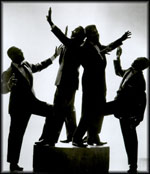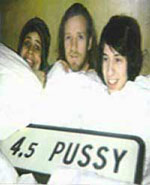Blotting Up The Tears | |

| Don Estelle was in the identity parade on Never Mind The Buzzcocks the other evening. Leaving aside the leap of imagination required to contemplate that Phill Jupitus wouldn't recognise this stalwart of 70s so-bad-it's-good-ism - put it this way, the others had to identify one of the ones who aren't dead in The Ruts - they showed a clip of Don's version of 'Whispering Grass' with Windsor 'You Is A Bunch Of Poofs' Davies. 'Whispering Grass' topped the charts in 1975, when every other record seemed to have a 'novelty' tag. Other number ones that year included 'If' by Telly Savalas, 'D.I.V.O.R.C.E.' by Billy Connolly, and, funniest of all, 'Space Oddity'. But Davies and Estelle's offering was possibly the most repugnant, especially since the original is a little gem of the pre-rock era. As recorded by the Ink Spots, lead tenor Bill Kenny's elegant enunciation barely conceals the sweet sadness of the lyric, and the minimalist, gently propulsive arrangement bestows an air of somebody going about his normal business simply to stop himself from crying. And what is this secret? Is he guilty because of some dark infidelity? Should we sympathise? The ambiguity is almost too much to bear. This shrug of sorrow is maintained in their take on 'Don't Get Around Much Anymore'. A Tin Pan Alley standard is transformed into a sensitive portrait of the luckless lover retreating into hermit mode, unable to face the world outside. And 'I'll Never Smile Again' faces up to the void of lost love, where the only relief is contemplating the unfeasible scenario that she'll change her mind. But this pall of melancholia isn't restricted to the Ink Spots' sadder songs. On 'Bless You For Being An Angel', Kenny, finally lucky in love, sounds as if he's going to burst into tears, unable to accept that he's worthy of this prize. Similarly, 'It's A Sin To Tell A Lie' sees the narrator needing so much assurance of his lover's fidelity that you feel she's probably going to dump him anyway, just for being a wimp. "If you break my heart I'll die," intones Kenny, acknowledging the anatomical basis for this emotional cliché. Only 'Java Jive' sounds as if the smiles are genuine - but if the only thing that makes you happy is a cup of coffee, you're really clutching at straws... At the time (the 1940s) this was an unusual, almost perverse voice in popular music. One can only assume that the ear-candy aspects of the Ink Spots sound smudged over the crypto-existential doom for listeners and record company executives. There's an element of the resigned misery of the blues, but the likes of Robert Johnson or Son House were all but unknown until the early 1960s. Johnnie Ray and Roy Orbison brought misery to the masses, but their tristesse was closer to theatrical hysteria than the bleak determinism of the Ink Spots. It wasn't until Frank Sinatra's Only The Lonely album (1958) that this strain of fatalistic bleakness could again be accommodated by the pop industry. It crops up here and there during the 60s and 70s: Macca's greatest moment, 'For No One' (on Revolver) has the same sense of brittle briskness hiding the truth, and the quieter moments of Jonathan Richman and Big Star have some of same sweet sorrow. Moe Tucker's rare solo spots for the Velvet Underground ('After Hours', 'I'm Sticking With You') are similarly rueful. Lyrically, Syd Barrett's 'Words' is just stream of consciousness, but listen to the controlled anguish in the voice. |

| But it's only in the last 20 years or so that Bill Kenny's shrug has become common pop currency. Consider the a capella 'It's A Fine Day' by the mysterious Jane, one of Cherry Red's instant classics and a regular spin on Janice Long's evening show. The only thing you can deduce from the pastoral crispness is that, whatever the day is, it's anything but fine. Jane's "we will have salad" offers the same paltry compensation as the Ink Spots' cappuccino. The key word in this kind of low-key tragedy is restraint. Not only must instrumentation be kept to the minimum, and sorrow mustn't descend into tearfulness or whining, but a whole album of this sort of stuff would probably be unbearable - imagine listening to the entire Sarah Records back catalogue at once. Instead, think of Graham Coxon's lo-fi lament 'You're So Great', contrasting with the Top-40 bombast of 'Song 2' and 'On Your Own' on Blur's eponymous 1997 album. The bass on Beck's 'Totally Confused' actually feels like raw sorrow building up in the pit of his stomach. Or consider the faux-cynical, I-only-sneer-to-keep-from-crying 'How Fucking Romantic' among the ukuleles and accordions on the Magnetic Fields' 69 Love Songs. And the dicks and drugs that litter The Moldy Peaches just fail to smother the heart-stopping 'Nothing Came Out'. Jealousy, body dysmorphia, unrequited love, recorders - "all I want to do is ride bikes with you". You can almost hear Bill Kenny sighing that to the grass and the trees. But not Don Estelle. Please, not Don Estelle. © TIM FOOTMAN 2001 2001 |